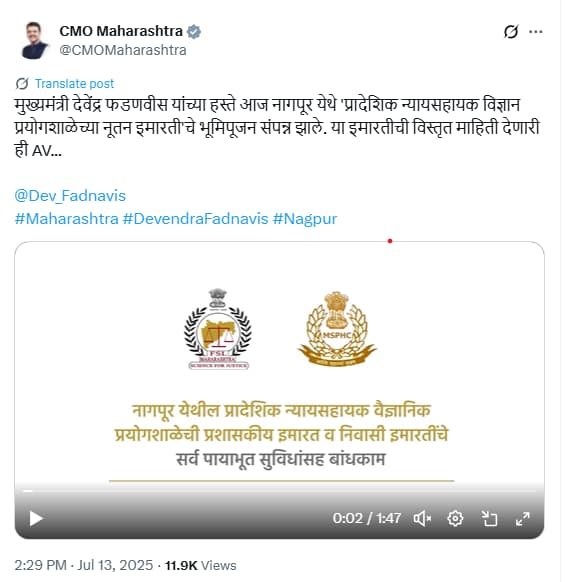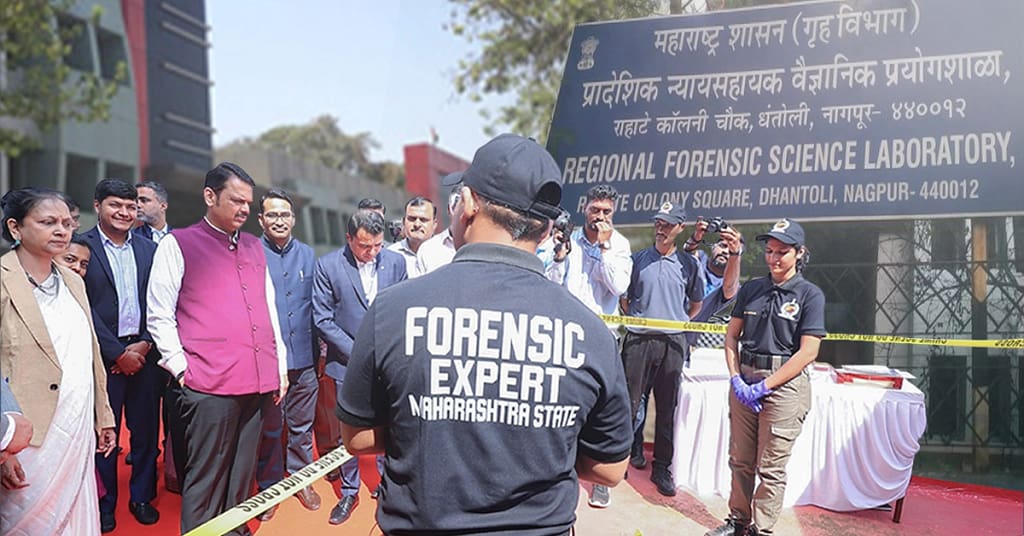Catching criminals is not enough, they must be convicted in court. Investigation to acquire evidence of crime to convict criminals is critical for the state police department to curb the crime rate. And the role of a forensic science laboratory is crucial in modern crime investigation, as they apply forensic science for accurate fact-finding, which prove innocence of the innocents and crime of the criminals to ensure justice. Recognizing the increasing rates of cybercrime, corruption, and other types of crimes and a need to boost the conviction rates in the state, especially in light of the three new criminal laws that came into effect from July 2024, CM and HM Fadnavis has issued directives to set up a well-oiled network of forensic labs in Maharashtra. It must be noted here that during his 1st tenure as Chief Minister of Maharashtra (2014-19), Devendra Fadnavis had started cyber crime cells in each district of the state besides initiating Maharashtra police reforms – the result was a six time increase in conviction rate of the state, from 9% before 2014 to 54% when he left. Now, coming back as the CM for the 3rd time, Fadnavis has vowed to take the tally to 90%.
The importance of forensic labs is increasingly becoming vital in the criminal justice system. Huge surge in cyber crimes has brought the need for well equipped forensic labs to the fore for investigating and resolving digital crimes with legally admissible evidence and identification of attackers. The cyber forensic labs also help in preventing future cyberattacks by analyzing vulnerabilities and improving overall security. The three new criminal laws – Bharatiya Nagarik Suraksha Sanhita (BNSS), Bharatiya Nyaya Sanhita (BNS) and Bharatiya Sakshya Adhiniyam (BSA) place a significant emphasis on forensic evidence as part of the modernization of the criminal justice system. The CM and HM Devendra Fadnavis recently laid the foundation stone of the proposed building of the Regional Forensic Science Laboratory in Nagpur on Sunday (July 13). On this occasion, he also inaugurated three major projects of the Home Department online – A Center of Excellence in Pune, the second phase of laboratory computerization, and a semi-automated system in Mumbai.

14 government decisions on one day for Maharashtra police reform and higher conviction rate
There was a time when conviction rates in the state were abysmally low. Cases would continue for many years only to result in release of the accused due to lack of solid evidence from the police. So, taking over the charge as CM, Devendra Fadnavis initiated Maharashtra police reforms by issuing 14 government decisions on a single day in 2015, which led to an increase in the rate of conviction of crimes in the state. The 14 decisions brought improvements/changes in areas like reviewing pending cases, bringing all government prosecutors under the control of the Directorate of Public Prosecutions, empowering senior police officers to appoint private lawyers, forming a committee and rules for the selection process of special government prosecutors, regular training of government prosecutors, promotion/reappointment related to the proof of charges, providing video conferencing facilities for hearing cases, providing necessary facilities to witnesses, appointing a defense officer in every court, appointing a central committee for the quality of charges, setting up an independent committee for laboratory empowerment, participation of government employees as referees in serious crimes, awarding the Chief Minister’s Medal for excellent work, and including conviction information in confidential reports.
Network of forensic laboratories in Maharashtra
In 2015, the state government had formed a committee to empower forensic scientific laboratories in the state. This committee had recommended the establishment of mini forensic science labs in the districts to resolve local cases on priority, increase conviction rate in criminal cases, and reduce burden on the regional forensic scientific laboratories. Accordingly, mini forensic laboratories were set up at the district level in Chandrapur, Gadchiroli, Dhule, Nandurbar, Thane, Palghar, Ratnagiri, Sindhudurg, Solapur and Osmanabad. Meanwhile, more RFSLs (Regional Forensic Scientific Laboratories) were set up in the state. Currently there are seven RFSLs in the state, namely Pune, Nagpur, Aurangabad, Nashik, Amravati, Nanded and Kolhapur, which are in network with the DFSL (Directorate of Forensic Science Laboratories) located in Mumbai.
Launch of ‘Mobile Forensic Labs’ in Maharashtra – first time in the country
The new criminal law, Bharatiya Nagrik Suraksha Sanhita, 2023 mandates site investigation by experts for crimes carrying a punishment of seven (7) years imprisonment or more. Also, the new Bhartiya Sakhya Adhiniyam specifies how to gather evidence. Therefore, in order to meet the stringent requirements of these laws and speed up the investigation process, CM Fadnavis introduced mobile forensic vans in the state on Jan 27, 2025. Launching a pilot project with 21 such vans equipped with the latest forensic technology, Maharashtra became the first state in the country to introduce mobile forensic labs. CM Fadnavis has announced a fund for 159 forensic vans with a team of four people in each van – a senior chemical analyser, a cyber expert, a general assistant, and a driver. They will visit sites of crimes, which might warrant punishment of seven years or more. The mobile forensic vans will have CCTV cameras and refrigerators to ensure that samples are collected properly and preserved at required temperature. The CM also said that most of the samples like blood, semen, narcotics, explosives, etc. can be tested on site and that the evidence will be stored using the blockchain technology to avert tampering of proofs.
With the network of forensic science laboratories, mobile forensic labs, and the advanced cyber forensic cells at the district level under the initiatives of a dynamic CM, Maharashtra is setting yet another example to be followed by other states. The state is now geared up to comply with the country’s new criminal laws 2024 and reach its goal of 90% conviction rate.

